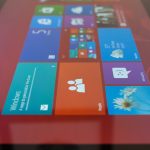Wishing Windows well in its new role

"The era of PC dominance with Windows as the single platform will be replaced with a post-PC era where Windows is one of a variety of environments that IT will need to support", Van Baker, Gartner research vice president, says. The days of Windows as the applications and device hub are over.
The implications are huge for businesses, which must adapt to something else, too. While native mobile apps are all the rage today, their future is uncertain. Gartner forecasts that by 2016, more than half of those deployed will be hybrid, and that's good for any platform favoring HTML5, including Windows.
Windows 8 is the new XP

Microsoft's newest and oldest supported PC operating systems share some strange similarities. Windows 8 and XP launched during times of tepid computer sales, forecasts of low adoption and initially weak sales. Neither lifted PC shipments during the launch quarter. Yet the older software went on to be such a workhorse, as much as 40 percent of the install base clings to the OS -- nearly 12 years after launch. That's the future I see. Windows 8 isn't the new Vista, as so many pundits proclaim, but the new XP.
I am quite vocal about the changing of computer eras, a position taken up before Apple started selling iPhone in early summer 2007. But the change is a process gradual at first that accelerates over time. In the case of Windows or the typical personal computer set against cloud-connected devices there can be redefinition, and, with it, renewed relevance. No one should underestimate Microsoft or ignore the past when evaluating present trends. The PC and Windows died before and resurrected.
ServicePower lets firms manage their workforces in the cloud [Q&A]

ServicePower -- a mobile workforce management software provider -- is seeing more and more companies turning to a workforce model that relies on a mix of full-time employees, third-party contractors, and independent technicians being brought together and managed seamlessly in one place using the power of the cloud.
I chatted with Mark Duffin, CEO and president of ServicePower, about the changes he’s seen recently, the data his firm collects, and why cloud deployment has become so important to his company and its clients.
FU, Windows 8, PC shipment decline is worst EVER

In some alternate universe, Microsoft CEO Steve Ballmer slaps former Windows & Windows Live president Steven Sinofsky on the back for a job well done. The company's newest operating system is such a huge success that sagging PC shipments soared to record numbers. Our reality is something shockingly different. First-quarter declines are the worst since IDC started tabulating numbers in 1994 and surpass the worst estimates. You know things are really bad when even perennial gainer Apple sees a huge year-of-year fall off.
"At this point, unfortunately, it seems clear that the Windows 8 launch not only failed to provide a positive boost to the PC market, but appears to have slowed the market", Bob O'Donnell, IDC vice president, says. Holy Moley, Windows 8 slowed the market? You want to know why Ballmer booted Sinfosky out the door? O'Donnell offers chilling indictment.
Microsoft is nowhere near death's door

I am both a Microsoft fanboy and hater, depending on which day I read comments from our BetaNews faithful. The truth be known, I consider myself neither. I would say it this way: I am a fanboy of what works and is useful to me and hater of everything on the opposite side of that line. I use products from many manufacturers, but yes, Microsoft powers all of my home computers, save the server, which is FreeBSD. Google is also a big part of my daily life, as is Adobe and many lesser-knowns.
For two days now, debate rages across the Internet about an analyst's content that Microsoft could be irrelevant within four years. I could do nothing but laugh when I read this. This revelation derives from Gartner report that states: "While there will be some individuals who retain both a personal PC and a tablet, especially those who use either or both for work and play, most will be satisfied with the experience they get from a tablet as their main computing device". Some individuals? By that, do you mean those who have jobs?
Gartner says the PC has no future

Today, Gartner offers grim prognostications for the PC's future, which is not surprising. That the analyst firm took so long disturbs and reveals much about how all these consultants seek to preserve client contracts before anything else. I've warned for years that connected-devices would diminish the personal computer's relevance, much like the mainframe's decline three decades ago. The PC era is over, as I asserted here 26 months ago. On Halloween 2008, I asked in a Microsoft Watch post: "Will your next PC be a smartphone?" What took Gartner so long? The "new device religion" analysis still misses the mark, too.
Following IDC's lead, Gartner now combines PCs, smartphones and tablets into a single forecast. By that measure, in 2012, Android worldwide device shipments (497 million) exceeded Windows (346.5 million) and will more than double (to 1.07 billion) by 2014. Analysts warn the operating system that defined the PC era will struggle with Apple iOS and OS X to be the second dominant platform. By many measures, the circumstance looks grim for Microsoft and Windows, and that's already the popular sentiment today among blog posts and news stories about Gartner's forecast. Don't believe them.
PC apocalypse: Emerging market buyers move from smartphones to tablets

IDC continues to send smoke signals that a blistering fire rages across the planet, sure to scorch the earth where PC manufacturers hoped to plant new computer sales. Emerging markets are engulfed in a blaze of smartphone and tablet adoption that leaves little hope for a desktop or notebook revival. I simply cannot overstate the speed this thing moves.
Eight days ago, the analyst firm revised downward PC shipment forecast for 2013, singling out changing buying patterns among emerging markets. Today IDC reaffirmed the forecast, while releasing final full-year 2012 PC, smartphone and tablet shipments. The data is grim pickings.
Post-PC era is REAL for U.S. Apple users

Today, comScore started a new service that ranks the top U.S. websites by desktop and mobile views -- the latter is a new measurement. Some of them really pop off the chart, with Apple glaring among traditional companies. More than one-third of unique visitors in February accessed the site via mobile device-only. That compares to 5 percent for Microsoft properties. Analysts, bloggers and journalists often portray the fruit-logo company as best representative of the so-called Post-PC era, and Windows' maker the epoch in decline.
The numbers aren't shocking, if you think about them. Windows has little presence on smartphones or tablets. Microsoft mobile OS smartphones share was just 3 percent during fourth quarter, according to Gartner. IDC forecasts Windows tablet market share, based on unit shipments, will be less than 5 percent this year. By comparison, iOS has greater reach, with, according to the company, cumulative shipments exceeding 500 million. Hell, Apple sold 43.5 million iPhones just in Q4, according to Gartner.
'Send to Kindle', and read it later

Last night something strange caught my attention, nearly enough to post a late-day story. Then this morning I got a little email nudge from Amazon PR, and thought: "Yeah. Why not?" The timing and broader ecosystem implications are interesting for service "Send to Kindle". Just as Google whacks RSS -- pulling feed icons from its products and setting Reader's execution -- Amazon provides a mechanism for saving content you come across, say, browsing at work for reading at home on your ebook reader or tablet.
The concept is by no means new, not even for Amazon. There are several good cloud services dedicated to saving content for later reading or incorporating the capability. Instapaper comes to mind, and Feedly has an easy tap mechanism to save for later. What makes Send to Kindle different is device/app-specificity. Additionally, websites, including WordPress blogs, can place a button supporting the service.
Samsung Galaxy S 4 is better than you think

I was wrong about the Galaxy S 4. Last week, I asserted that brand sentiments had changed enough here -- given Samsung's rising popularity, Apple's image problems and high-profile iPhone-to-Android switchers -- that the South Korean electronics giant could launch the S 4 in the United States. Nope. Reception among bloggers, journalists and the Technorati is largely ice cold. Most first-takes I see call the handset a S 3s and no better than iPhone 5. Idiots.
If Steve Jobs was still alive and introduced a Star Trek-like universal translator for iPhone, there would be cries: "Apple does it again". Tell me what's not innovative about translation from, say, English to Chinese or Japanese to French. In real time. On your phone. Or text-to-speech and speech-to-text translation capabilities? Imagine Jobs demonstrating the "Eraser" feature by taking a photo and jokingly removing marketing executive Phil Schiller from the photo. He could demonstrate dual-mode video by initiating a call with Schiller that includes members of the audience, which I promise would roar and clap.
I'm shocked! Shocked! More teens have cell phones and use the Internet

As the parent of two teenagers I am always interested in studies about their digital lifestyle. Pew Research Center has a new report that claims that "smartphone adoption among American teens has increased substantially and mobile access to the internet is pervasive". You don't say? I believe I could have told you that simply by visiting my local mall. So much for the "tell us something we don't know" moment.
Still, the research firm did its homework and published some interesting numbers. Pew studied a group of 802 teens between the ages of 12 and 17 to reach its results. For instance, 78 percent of all teens have cell phones and almost half of those, 47 percent, are smartphones. For the record, in our household it is an even 50 percent -- the 16 year old has a smartphone, the 13 year old does not yet have his first phone, though it is a subject that seems to come up daily.
PC shipments go from worse to, well, you don't want to know

IDC sure knows how to ruin a Monday. The analyst firm released final personal computer shipment tabulations for fourth quarter and all 2012 and made a dismal forecast for this year. If you're as tired of reading "PC is dead" stories as I am writing them, cover your eyes. Read no further. The horrors ahead are unbearable.
Global shipments will decline for the second year in a row in 2013, with Windows 8 giving no perceptual lift at all. Holidays were a bust, as will be the year. You can't fault Microsoft for trying, but there is only so much water you can throw off a sinking ship with buckets before it plunges beneath the waves. Perhaps only the rumored Windows Blue can save the PC now, but Win8 was supposed to do that -- and look what happened. When an analyst firm uses "underwhelming reception" to describe a Microsoft operating system, it's time to abandon ship.
U.S. smartphone adoption is lowest in developed world, South Korea highest

Today at Mobile World Congress, Nielsen offered a snapshot of the global mobile consumer based on a report released this month. Some of the findings are quite startling. For example, mobile phone usage is highest in South Korea -- get this, 99 percent among consumers older than 16. Same goes for smartphones (67 percent). By comparison, the United States has the lowest smartphone adoption among developed markets (53 percent). Now contrast that to China, where two-thirds of handset owners have smartphones, while in India 80 percent have feature phones. In Brazil, feature phones and multimedia handsets combined: 65 percent.
Mobile phone usage is high in many countries, but infrastructure is not. For example, 98 percent of Russians have mobiles, as do 84 percent in Brazil and 81 percent in India. Problem, according to Nielsen: "The network infrastructure required for smartphones and next generation mobile devices has yet to appear outside of large, urban centers". Lacking infrastructure explains some of this week's MWC announcements, such as Firefox OS phones or new Nokia Lumias with fewer smartphone features for lower selling prices going to emerging markets first.
IT spending shifts from PCs to cloud, smartphones and tablets

Cue the violins. IDC says that the cloud, smartphone and tablet are reshaping IT spending, using the word personal computing defenders despise: "Cannibalization". There's a reason I dismiss the post-PC moniker for cloud-connected device era.
"Cannibalization is happening across the industry" Stephen Minton, IDC vice president, says. "Smartphones have taken over from feature phones, tablet adoption is impacting PC spending, and the cloud is affecting the traditional software, services and infrastructure markets". And you people wonder why Google would make in Chromebook Pixel a high-end cloud computer. It's the future, baby.
Today Google made me want Glass

We all have heard about Google Glass -- for sometime now. There's talk it's coming (but not when) and that there are unique capabilities (but most details are under wraps). Google Glass is a bit of an enigma, and I have remained largely uninterested in the project. That changed this morning.
Google makes me want a product I had no idea I was even interested in -- I am pretty sure that's the intention. In fact, Google had me drooling in only two minutes and sixteen seconds -- talk about a good sales pitch. And the video did not even require many words to accomplish its task.
Recent Headlines
© 1998-2024 BetaNews, Inc. All Rights Reserved. Privacy Policy - Cookie Policy.